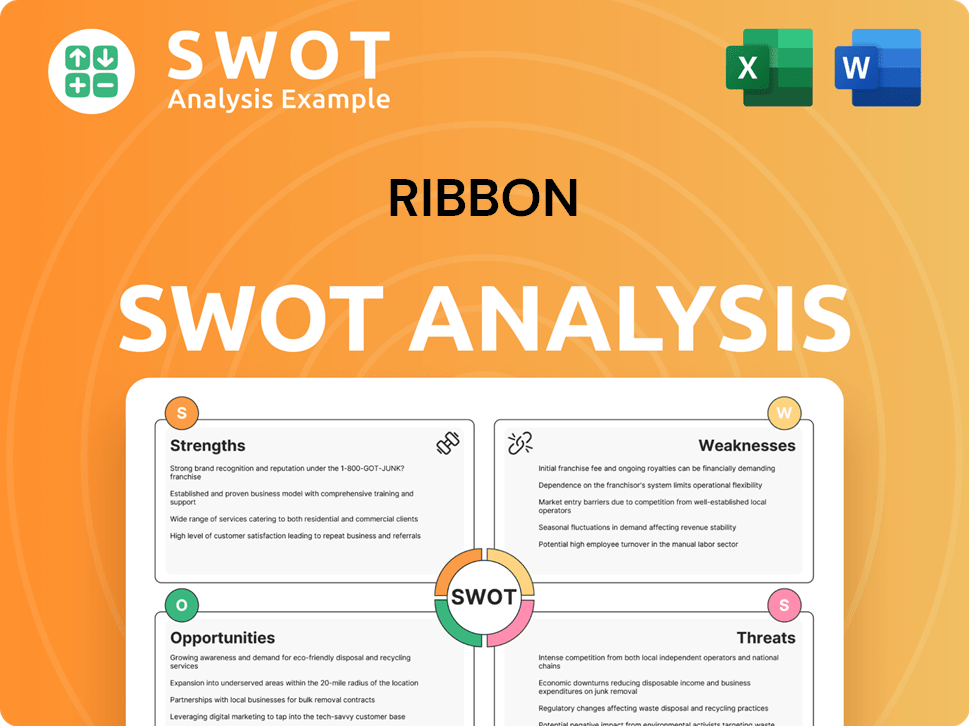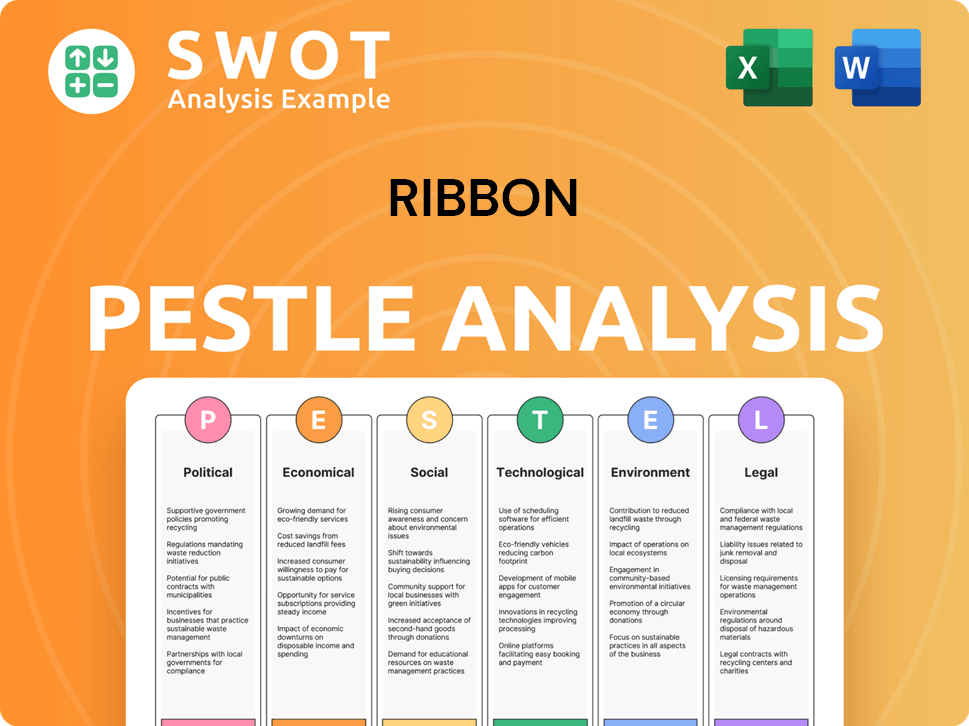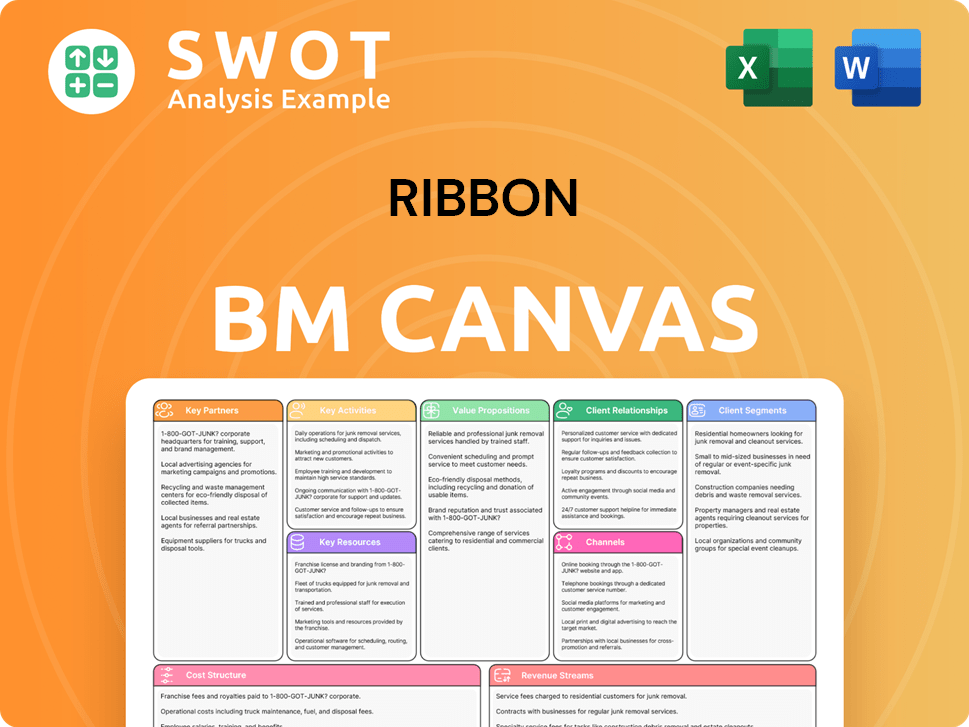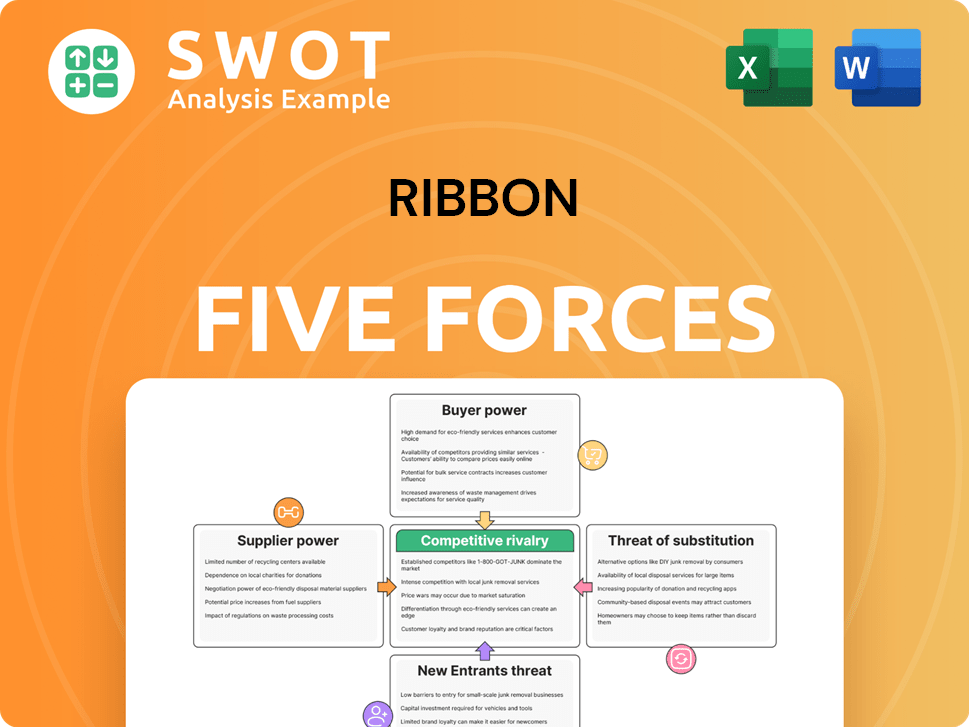Ribbon Bundle
Who Really Owns Ribbon Communications?
Unraveling the ownership structure of a company is key to understanding its trajectory. This is especially true for a company like Ribbon Communications, a key player in the Ribbon SWOT Analysis, whose past mergers have shaped its current form. Discovering the 'who owns Ribbon Company' will expose the influences driving its strategic decisions and future growth. Understanding the Ribbon Company owner is crucial for anyone invested in the Ribbon business.

This exploration into Ribbon Company Ownership will provide a comprehensive analysis of its stakeholders, from institutional investors to public shareholders. We'll examine the evolution of its ownership, including the impact of key events and the roles of its leadership. Understanding the Ribbon industry and the forces shaping it requires a deep dive into the company's financial performance and the individuals and entities that control its destiny.
Who Founded Ribbon?
The ownership structure of Ribbon Communications is complex, stemming from the 2017 merger of Genband and Sonus Networks. Understanding the founders and early ownership of these two companies is key to grasping the current Ribbon Company ownership.
Sonus Networks and Genband, the predecessors of Ribbon Communications, each had distinct origins and ownership structures that shaped the company's foundation. This chapter delves into the founders and early investors of these companies, providing insights into the evolution of Ribbon Company ownership.
The formation of Ribbon Communications in October 2017 brought together the histories of Genband and Sonus Networks, creating a new entity in the telecommunications sector. This merger resulted in a composite ownership structure, reflecting the shareholders and investors of the two original companies.
Sonus Networks, Inc. was established in August 1997. The founders included Jay Pasco-Anderson, Karl Schwiegershausen, Michael G. Hluchyj, Rubin Gruber, and Tony Risica.
Sonus Networks had its initial public offering (IPO) on May 31, 2000. The IPO raised over $100 million and the company was listed on Nasdaq under the symbol SONS.
Early investors in Sonus Networks included venture capital firms. These firms included Bedrock Ventures, Bessemer Venture Partners, Charles River Ventures, Matrix Partners, and North Bridge Venture Partners.
Genband, originally General Bandwidth, was founded in 1999. The founders were Paul Carew, Brendon Mills, Ron Lutz, and Steve Raich.
Genband initially received $12 million in venture capital funding. Over four rounds of venture funding, the company raised over $200 million.
In June 2010, Genband was re-incorporated as Genband, Inc. At that time, an equity investment of approximately $4 million from executives and board members was disclosed.
The early ownership of both Sonus Networks and Genband was significantly influenced by venture capital investments. These early investments were crucial for the development of advanced telecommunications solutions, which ultimately led to the formation of Ribbon Communications. The evolution of the ownership structure reflects the strategic shifts and financial milestones of the companies. For further insights, you can explore the history and ownership of Ribbon Communications.
The founders and early investors played a vital role in shaping the trajectory of both Sonus Networks and Genband.
- Sonus Networks' IPO in 2000 marked a significant financial milestone.
- Genband's funding rounds supported its growth and expansion.
- The merger of Sonus and Genband created Ribbon Communications.
- Understanding the early ownership helps to understand Ribbon Company ownership.
Ribbon SWOT Analysis
- Complete SWOT Breakdown
- Fully Customizable
- Editable in Excel & Word
- Professional Formatting
- Investor-Ready Format

How Has Ribbon’s Ownership Changed Over Time?
The ownership structure of Ribbon Communications Inc. (Nasdaq: RBBN) has evolved since its formation in 2017 through the merger of Genband and Sonus Networks. As of June 10, 2025, the company has approximately 177 million shares outstanding. This evolution reflects changes within the Growth Strategy of Ribbon and the broader telecommunications industry.
As of June 10, 2025, institutional investors hold a significant portion of the company's shares. There are 321 institutional owners and shareholders holding a total of 147,284,413 shares, representing 83.43% of shares excluding 13D/G filings. The ownership structure includes a mix of institutional investors, mutual funds, and individual insiders.
| Shareholder | Shares Held (as of March 31, 2025) | Percentage of Shares |
|---|---|---|
| JPMorgan Chase & Co. | 52,038,874 | Not Specified |
| Neuberger Berman Group LLC | 18,311,527 | Not Specified |
| Paradigm Capital Management Inc/NY | 9,511,200 | Not Specified |
| BlackRock, Inc. | 7,788,905 | Not Specified |
| Vanguard Group Inc. | 7,457,467 | Not Specified |
Key institutional investors, as of March 31, 2025, include JPMorgan Chase & Co., Neuberger Berman Group LLC, and others. As of May 2025, institutional ownership accounts for approximately 43.2% of the company's stock. The market capitalization reached $729.60 million in December 2024, a 46.5% increase from January 2024, but decreased to $596.72 million as of May 30, 2025.
Understanding the ownership structure of Ribbon Company is crucial for investors and stakeholders. The company's ownership is primarily composed of institutional investors. This structure can influence the company's strategic direction and governance.
- Institutional investors hold a significant portion of the shares.
- Major shareholders include firms like JPMorgan Chase & Co.
- Market capitalization has fluctuated.
- Changes in ownership can impact company strategy.
Ribbon PESTLE Analysis
- Covers All 6 PESTLE Categories
- No Research Needed – Save Hours of Work
- Built by Experts, Trusted by Consultants
- Instant Download, Ready to Use
- 100% Editable, Fully Customizable

Who Sits on Ribbon’s Board?
The current board of directors at Ribbon Communications guides the company's strategic direction and governance. Board members typically represent major shareholders, founders, or independent seats. Although specific details about each board member's shareholding percentages for 2024-2025 are not available in the provided search results, the company's investor relations website offers information on its corporate governance, including the board's composition and committee structure. For more details on the company's strategic approach, you can refer to the Marketing Strategy of Ribbon.
Publicly traded companies like Ribbon Communications usually operate on a one-share-one-vote basis. The provided information does not specify any special voting rights, golden shares, or founder shares that might grant outsized control. However, the influence of major institutional shareholders, such as JPMorgan Chase & Co., Neuberger Berman Group LLC, and BlackRock, Inc., is substantial due to their significant equity holdings. These large institutional investors can influence management decisions and impact the company's stock price through their buying and selling patterns.
| Shareholder | Approximate Ownership (as of recent filings) | Influence |
|---|---|---|
| JPMorgan Chase & Co. | Varies, but significant | Influential due to large holdings |
| Neuberger Berman Group LLC | Varies, but significant | Influential due to large holdings |
| BlackRock, Inc. | Varies, but significant | Influential due to large holdings |
Recent proxy battles or activist investor campaigns are not detailed in the provided information. However, the company's financial results and strategic decisions, such as the $50 million share repurchase program announced in June 2024, reflect the confidence of the Board of Directors in the company's strategic plan and performance. This program, funded through cash on hand or operational cash flow, demonstrates a governance decision impacting shareholder value.
Understanding the board of directors and the voting structure is crucial for assessing the company's governance. Major institutional investors have a significant influence on the company's direction.
- Board members oversee strategic direction and governance.
- Institutional investors impact management decisions.
- Share repurchase programs reflect board confidence.
- The company's investor relations website provides details on corporate governance.
Ribbon Business Model Canvas
- Complete 9-Block Business Model Canvas
- Effortlessly Communicate Your Business Strategy
- Investor-Ready BMC Format
- 100% Editable and Customizable
- Clear and Structured Layout

What Recent Changes Have Shaped Ribbon’s Ownership Landscape?
Over the past few years, the ownership structure of Ribbon Communications has seen some significant shifts. In June 2025, the company announced a share repurchase program, indicating confidence in its strategic direction. This program, which allows for the repurchase of up to $50 million of shares, is slated to run from June 5, 2025, through December 31, 2027, and will be funded via cash on hand or operational cash flow.
Furthermore, the company has been involved in strategic acquisitions and divestitures. The acquisition of ECI Telecom, finalized in March 2020, and the sale of the Kandy Communications Business to AVCTechnologies in December 2020, are key examples. These activities impact the overall ownership profile and reflect the company's efforts to adapt to market changes and strategic goals. Institutional investors currently hold a substantial portion of the company's shares.
| Metric | Details | Date |
|---|---|---|
| Institutional Ownership | Approximately 83.43% of shares (excluding 13D/G filings) | June 10, 2025 |
| Institutional Ownership | Approximately 43.2% of shares | May 2025 |
| Share Repurchase Program | Up to $50 million | June 5, 2025 - December 31, 2027 |
The high level of institutional ownership suggests a strong reliance on professional fund management. The company anticipates profitable growth for 2025, with projected revenue between $870 million and $890 million. This, along with network modernization efforts, is expected to shape the company's market position and its attractiveness to investors. Understanding the ownership structure is crucial for anyone looking into the Competitors Landscape of Ribbon and the broader ribbon industry.
Institutional investors hold a significant portion of the company's shares, with ownership figures around 83.43% as of June 2025. The company also has a share repurchase program.
The ownership structure is largely influenced by institutional investors. The company's strategic moves, like share repurchases and acquisitions, affect the ownership dynamics.
The company is expecting to see profitable growth in its operating segments for 2025. The company is also involved in strategic acquisitions.
The company is projecting revenues between $870 million and $890 million. This shows the company’s current business status and its future in the ribbon industry.
Ribbon Porter's Five Forces Analysis
- Covers All 5 Competitive Forces in Detail
- Structured for Consultants, Students, and Founders
- 100% Editable in Microsoft Word & Excel
- Instant Digital Download – Use Immediately
- Compatible with Mac & PC – Fully Unlocked

Related Blogs
- What are Mission Vision & Core Values of Ribbon Company?
- What is Competitive Landscape of Ribbon Company?
- What is Growth Strategy and Future Prospects of Ribbon Company?
- How Does Ribbon Company Work?
- What is Sales and Marketing Strategy of Ribbon Company?
- What is Brief History of Ribbon Company?
- What is Customer Demographics and Target Market of Ribbon Company?
Disclaimer
All information, articles, and product details provided on this website are for general informational and educational purposes only. We do not claim any ownership over, nor do we intend to infringe upon, any trademarks, copyrights, logos, brand names, or other intellectual property mentioned or depicted on this site. Such intellectual property remains the property of its respective owners, and any references here are made solely for identification or informational purposes, without implying any affiliation, endorsement, or partnership.
We make no representations or warranties, express or implied, regarding the accuracy, completeness, or suitability of any content or products presented. Nothing on this website should be construed as legal, tax, investment, financial, medical, or other professional advice. In addition, no part of this site—including articles or product references—constitutes a solicitation, recommendation, endorsement, advertisement, or offer to buy or sell any securities, franchises, or other financial instruments, particularly in jurisdictions where such activity would be unlawful.
All content is of a general nature and may not address the specific circumstances of any individual or entity. It is not a substitute for professional advice or services. Any actions you take based on the information provided here are strictly at your own risk. You accept full responsibility for any decisions or outcomes arising from your use of this website and agree to release us from any liability in connection with your use of, or reliance upon, the content or products found herein.